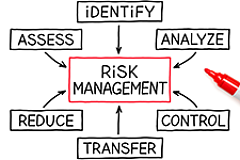The pandemic changed the business world in many ways. Before, companies focused mainly on profits and growth. Now, there's more to think about. Health and safety, working from home, and using new technology have become vital to running a business. These changes also shifted what it means to be a leader.
In the past, being in charge was mostly about making decisions and guiding a team. But now, leaders face new challenges. They must be flexible, understand technology, and care about their team's well-being.
This new era calls for a different kind of leadership. It's not just about being the boss anymore. It's about:
- Adapting to changes,
- Understanding new ways of working, and
- Helping teams through tough times.
For small and medium-sized businesses, this means rethinking how to lead and succeed in a different world.
The Evolving Role of Leadership Post-Pandemic
Since the pandemic, the role of a business leader has seen big changes. Before, leaders often focused on setting goals and ensuring the team met them. However, leaders must now be ready for sudden changes and know how to handle them. They must also understand and use new technology to keep the business running smoothly, primarily when people work from home.
A study by McKinsey & Company found that more than 90 percent of companies plan to adopt new ways of working that they didn't use before the pandemic. Leaders now have to be more than just decision-makers. They need to understand and care about their team's needs and feelings. This means listening more, being open to new ideas, and helping the group work better.
Skills and Traits Essential for Modern Leaders
Business leaders today need a mix of skills and traits to guide their teams effectively. Here are some key attributes you should have:
1. Emotional Intelligence. This means understanding and managing your emotions and being aware of others' feelings. It's about more than just being nice – it helps make better decisions and build solid teams. A report by PwC Malta found that 77 percent of businesses now see emotional intelligence as a key skill for their leaders.
2. Adaptability. The ability to change plans quickly is crucial. The business world is constantly evolving, especially since the pandemic. Leaders who can adapt can help their businesses survive and grow, even when things are uncertain.
3. Digital Literacy. Understanding technology is more critical than ever. With many people working from home and customers shopping online, leaders must know how to use digital tools. This isn't just for tech companies. All businesses need to keep up with technology.
4. Problem-Solving. Leaders face problems every day. Being able to think of solutions quickly and effectively is key. This means looking at a problem from different angles and coming up with creative solutions.
5. Communication. Good leaders know how to share ideas clearly and listen to others. This helps ensure everyone understands what's going on and feels heard. It's important to keep the team working well together.
6. Empathy. This is about understanding and caring about what others are going through. It's especially important now, as many people are dealing with challenges from the pandemic. Leaders with empathy can build trust and a strong team spirit.
These skills and traits help modern leaders guide their companies through tough times, make the most of new opportunities, and build a business that can handle challenges and keep growing.
Strategies for Leaders to Adapt and Thrive in the New Normal
In the new normal, business leaders face many changes. Some strategies to help them adapt and succeed include:
- Staying Flexible. Being flexible means being ready to change plans when needed. This could be changing how the business works or trying new ways to reach customers. Flexibility helps companies stay strong, even when things are tough.
- Focusing on Team Well-Being. Taking care of the team is more important than ever. This means ensuring employee groups have what they need to work well, whether in the office or at home. Happy and healthy teams do their best work.
- Continual Learning. The world is constantly changing, and so is the way we do business. Leaders should keep learning about new trends and ideas. This helps them make smart decisions and find new chances to grow the company.
- Using Technology Wisely. Technology can help businesses work better and reach more customers. Leaders should understand how to use technology best for their company.
- Listening and Communicating. Good leaders listen to their teams and share information. This helps everyone understand what's happening and work together better.
Research shows businesses that quickly adapt to the new normal have a 72 percent better chance of doing well. This indicates how important it is for leaders to be ready for change and to keep their businesses moving forward.
New Talents for a New Leadership Era
This new era of leadership demands a shift in the skills and traits required for effective management. Leaders need emotional intelligence, adaptability, digital literacy, problem-solving, communication, and empathy to guide their teams through uncertain times and capitalize on emerging opportunities.
To adapt to this new normal, leaders must embrace flexibility, prioritize team well-being, commit to continuous learning, use technology strategically, and foster open communication. It's crucial to integrate new skills and strategies into their leadership approach to ensure the resilience and growth of their businesses while fostering a responsive, innovative, and empathetic work culture.
For Record-breaking results, you must unleash your leadership potential quickly and efficiently.
Here’s how: Get in touch and let's set up a time to discuss your company and the results you want from your team. There is never any obligation and as certified business coaches, we hold all discussions in confidence. Brian Tracy USA: 877.433.6225 Email Me feedback@focalpointcoaching.com
Resources:
- https://www.hortoninternational.com/news/leadership-skills-for-a-post-pandemic-world
- https://www.forbes.com/sites/forbescoachescouncil/2022/07/19/five-essential-traits-of-post-pandemic-leadership/
- https://www.pwc.com/mt/en/publications/humanresources/redefining-leadership-in-a-post-pandemic-world.html
- https://www.imd.org/ibyimd/leadership/the-changing-requirements-of-leadership-how-to-inspire-in-a-post-pandemic-world/
- https://www.mckinsey.com/featured-insights/mckinsey-live/webinars/better-bosses-changing-the-way-we-lead-postpandemic
- https://www.forbes.com/sites/forbeshumanresourcescouncil/2022/05/16/the-top-five-qualities-every-leader-must-have-to-adapt-to-a-post-pandemic-business-environment/
- https://hbr.org/2021/04/6-leadership-paradoxes-for-the-post-pandemic-era
- https://hbr.org/2021/11/3-strategies-to-help-employees-thrive-in-the-new-normal
- https://www.weforum.org/agenda/2021/12/how-to-adapt-post-pandemic-workplace-young-global-leaders/
- https://www.forbes.com/sites/richardosibanjo/2022/02/27/the-post-pandemic-workplace-5-shifts-every-leader-must-make/
- https://newageleadership.com/developing-leaders-to-thrive-in-the-new-normal/














